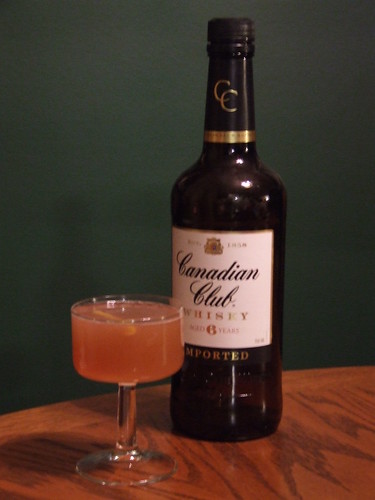
In honor of this past Monday's anniversary of Prohibition repeal, this week's cocktail is The Scofflaw.
To quote The Cocktail Spirit with Robert Hess:
It was in 1923, when Delcevare King, a member of the Anti-Saloon League, posed a contest to create a new word in order to combat the continued drinking which was going on during American Prohibition. The new word was to be one "which best expresses the idea of a lawless drinker, menace, scoffer, bad citizen, or whatnot, with the biting power of 'scab' or 'slacker.'" The $200 prize elicited a huge response. On January 16th, 1924, the Boston Herald announced the winning word as "scofflaw", with the winnings shared by the two Boston area residents, Henry Irving Dale and Kate L. Butler, who both submitted it. This was not the end of the story however, in just a little over a week, a salvo was launched from Harry's New York Bar in Paris, where they created a new drink and christened it the "Scofflaw".
Those of us Americans who enjoy an old-style cocktail have something to thank those scofflaws for, and the drink is a good one to celebrate the repeal of prohibition. I find it interesting to note that the word has come to mean "A person who flouts the law, esp. by failing to comply with a law that is difficult to enforce effectively." as per the Google dictionary. What strikes me about this current definition is that the word is now a critique of the law as well as the law-breaker. World Wide Words defines it as "A person who flouts a law, especially an unsustainable one," and says "it often refers to persistent offenders against parking laws and other minor regulations." Not all dictionaries make this distinction between the meaning of scofflaw and criminal wherein the law in question is criticized, however I find the distinction to be a marked critique of Prohibition and of other current laws that they would be equating to Prohibition.
After looking at a number of recipes, I chose to use the one Kenn posted on Cocktailia, which follows what appears to me to be the most typical ratio of rye to dry vermouth, most typical amounts of lemon juice and grenadine and also includes orange bitters, which is always included in the recipes with slightly different ratios. I also included a lemon twist, which frequently appears in the recipes.
The Scofflaw
1 1/2 oz Rye whiskey
1 oz Dry vermouth
3/4 oz Lemon juice
3/4 oz Grenadine
2 dashes Orange bitters
1 Lemon twist (garnish)
Shake over ice and strain into a chilled cocktail glass. Garnish with a lemon twist.
I chose to use Canadian whiskey, rather than American rye because I was reading that this was likely what was used during Prohibition when this drink was invented. Canadian whiskey is historically referred to as rye whiskey, though unlike American rye, it has no legal definition of rye percentage. Per Wikipedia "Historically, in Canada, whisky that had some rye grain added to the mash bill to give it more flavour came to be called “rye”. Although many Canadian whiskies are still labelled as “rye”, the modern mash bill for a Canadian “rye” whisky often contains little or no rye grain, and their flavour is derived in other ways (such as flavour development from the aging process, blending with stronger-tasting Canadian whiskies, and the addition of flavourings)." On the other hand, American rye "is, by law, made from a mash of at least 51 percent rye." Under Canadian law, "rye whiskey" and "Canadian whiskey" are synonymous, so a drink made during prohibition was most likely made with Canadian whiskey.
Canadian Club seemed particularly appropriate given its popularity here in Detroit, where many scofflaws ventured across the Detroit River in rowboats or over the winter ice pack in cars to bring it back from Hiram Walker Distillery in Windsor, Ontario. The same laws and the same geographical situation that led Hiram to move from Detroit to Windsor to establish his distillery ironically led to the prominence of The Purple Gang, and the national dominance of Detroit as a liquor-smuggling port. This dominance was supported by the burgeoning auto industry and the suped-up cars that savvy Detroit gangsters were able to have built for their rum running. Anyway, back to it.
The verdict: I think I may have been a bit heavy-handed with the orange bitters. I think the orange overtook, with the red fruit of the grenadine close behind. It seemed a bit like a boozy version of those pea-sized powdered-sugar-dusted hard candies that came in round white tins when I was a kid. I don't remember what they're called, but that's what it made me think of. I can think of a number of people who would like it just as-is, but as for myself, I would try it with a more pungent American rye or dial back on the lemon juice, grenadine and orange bitters. Of course, part of this may be that my grenadine is rich simple syrup, rather than 1:1, which I am starting to suspect is more common.
No comments:
Post a Comment